Record revealed
Police report on the disappearance of Agatha Christie
This letter discusses the strange disappearance of famous author Agatha Christie in December 1926. Written by a member of the Surrey Constabulary and preserved among Home Office records, it details the police investigation that followed.
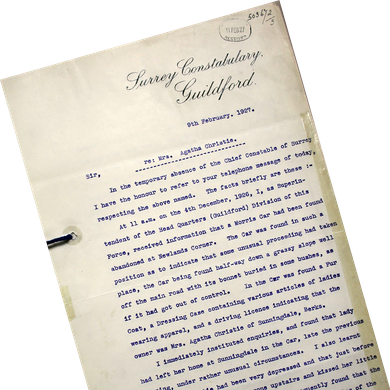
Image 1 of 6
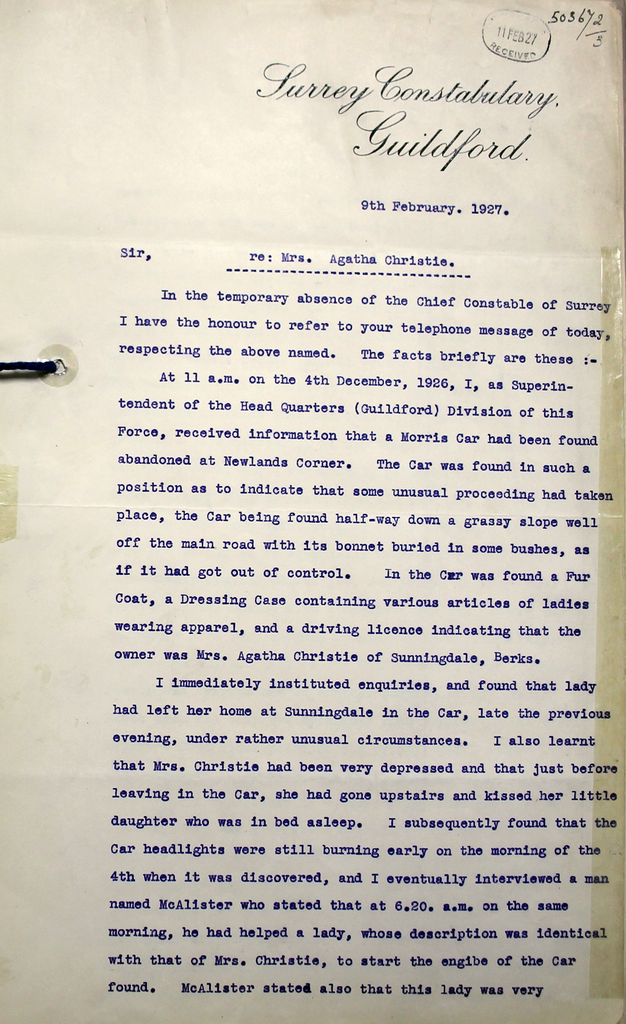
Partial transcript
At 11 a.m. on the 4th December, 1926, I, as Superintendent of the Head Quarters (Guildford) Division of this Force, received information that a Morris Car had been found abandoned at Newlands Corner. The Car was found in such a position as to indicate that some unusual proceeding had taken place, the Car being found half-way down a grassy slope well off the main road with its bonnet buried in some bushes, as if it had got out of control. In the Car was found a Fur Coat, a Dressing Case containing various articles of ladies wearing apparel, and a driving licence indicating that the owner was Mrs. Agatha Christie of Sunningdale, Berks.
I Immediately Instituted enquiries, and found that lady had left her home at Sunningdale in the Car, late the previous evening, under rather unusual circumstances. I also learnt that Mrs. Christie had been very depressed and that just before leaving in the Car, she had gone upstairs and kissed her little daughter who was in bed asleep. I subsequently found that the Car headlights were still burning early on the morning of the 4th when it was discovered, and I eventually interviewed a man named McAlister who stated that at 6.20. a.m. on the same morning, he had helped a lady, whose description was identical with that of Mrs. Christie, to start the engine of the Car found. McAlister stated also that this lady was very
Image 2 of 6
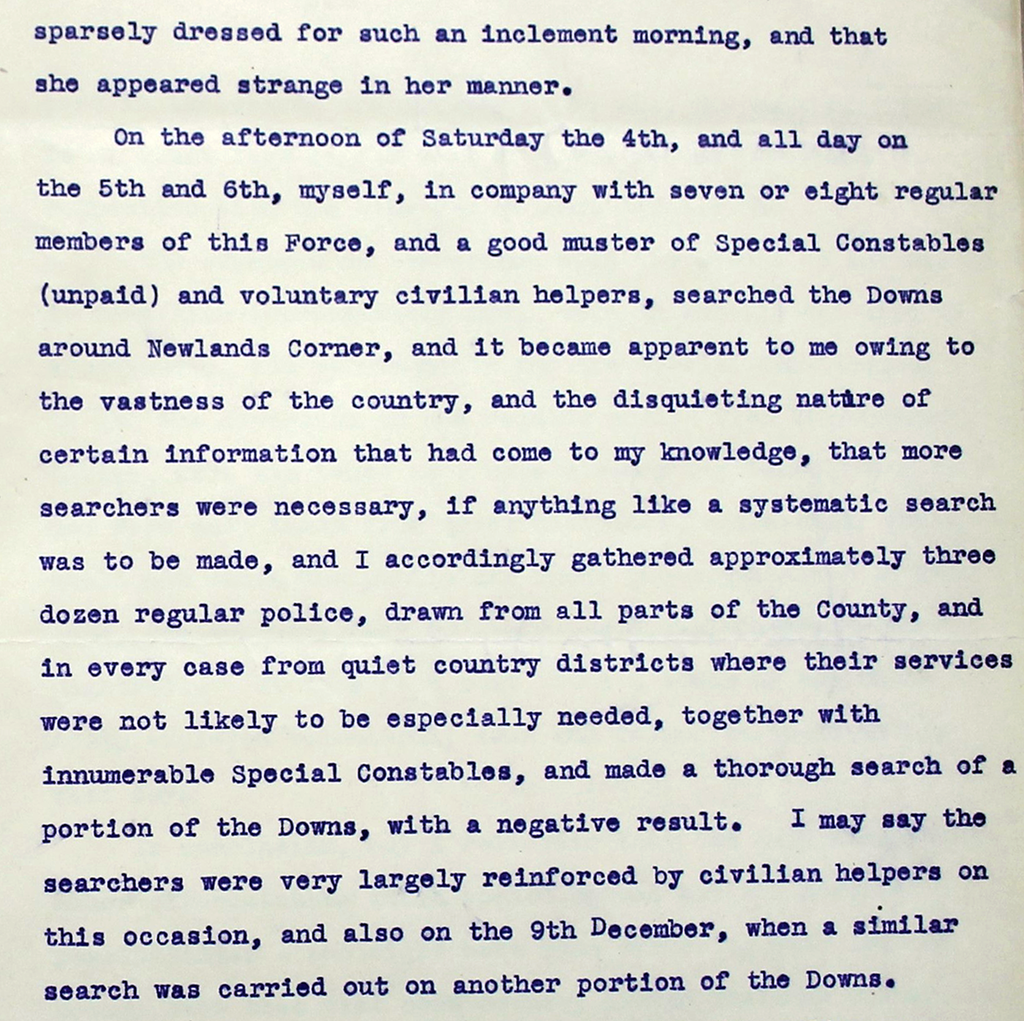
Transcript
sparsely dressed for such an inclement morning, and that she appeared strange in her manner.
On the afternoon of Saturday the 4th, and all day on the 5th and 6th, myself, in company with seven or eight regular members of this Force, and a good muster of Special Constables (unpaid) and voluntary civilian helpers, searched the Downs around Newlands Corner, and it became apparent to me owing to the vastness of the country, and the disquieting nature of certain information that had come to my knowledge, that more searchers were necessary, if anything like a systematic search was to be made, and I accordingly gathered approximately three dozen regular police, drawn from all parts of the County, and in every case from quiet country districts where their services were not likely to be especially needed, together with innumerable Special Constables, and made a thorough search of a portion of the Downs, with a negative result. I may say the searchers were very largely reinforced by civilian helpers on this occasion, and also on the 9th December, when a similar search was carried out on another portion of the Downs.
Image 3 of 6
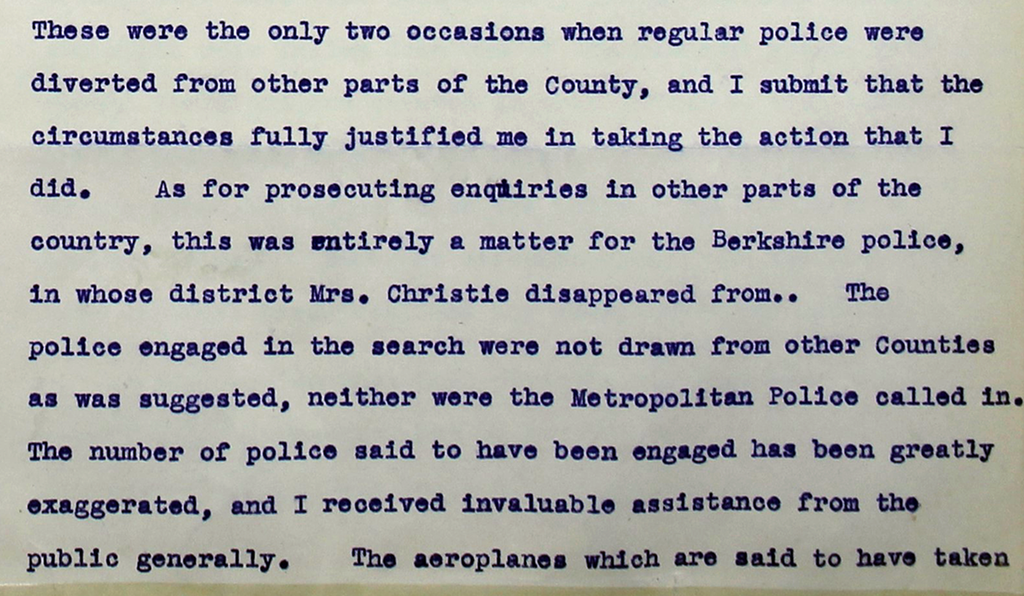
Transcript
These were the only two occasions when regular police were diverted from other parts of the County, and I submit that the circumstances fully justified me in taking the action that I did. As for prosecuting enquiries in other parts of the country, this was entirely a matter for the Berkshire police, in whose district Mrs. Christie disappeared from. The police engaged in the search were not drawn from other Counties as was suggested, neither were the Metropolitan Police called in. The number of police said to have been engaged has been greatly exaggerated, and I received invaluable assistance from the public generally. The aeroplanes which are said to have taken
Image 4 of 6
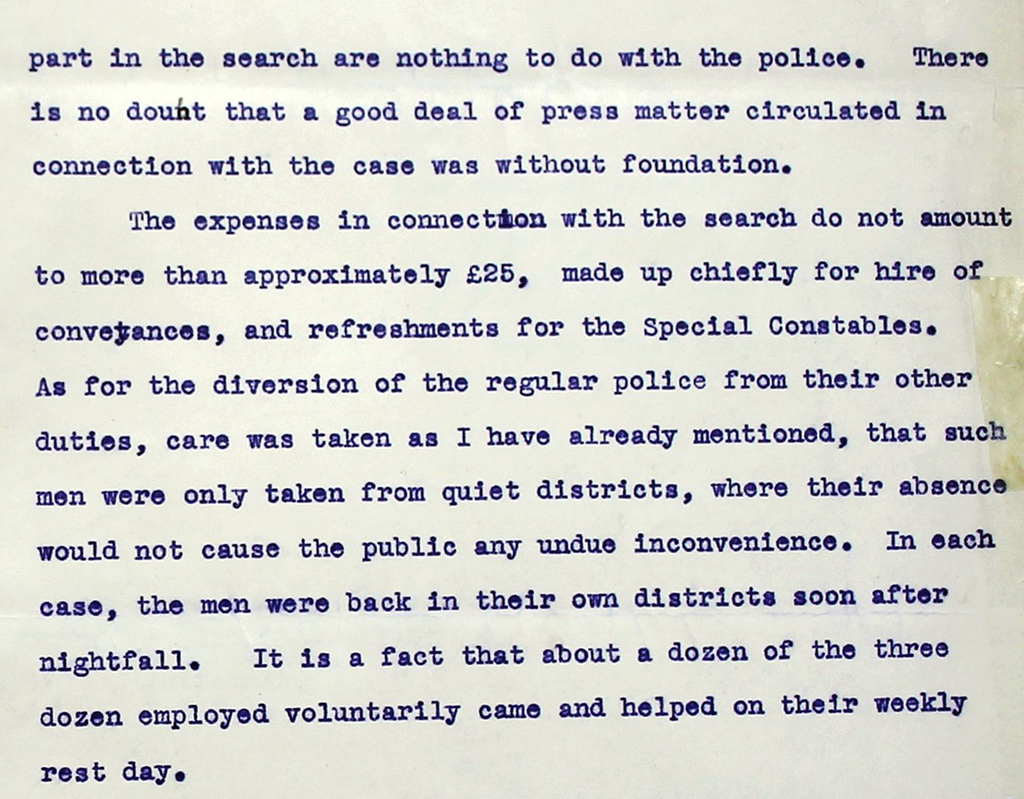
Transcript
part in the search are nothing to do with the police. There is no doubt that a good deal of press matter circulated in connection with the case was without foundation.
The expenses in connection with the search do not amount to more than approximately £25, made up chiefly for hire of conveyances, and refreshments for the Special Constables. As for the diversion of the regular police from their other duties, care was taken as I have already mentioned, that such men were only taken from quiet districts, where their absence would not cause the public any undue inconvenience. In each case, the men were back in their own districts soon after nightfall. It is a fact that about a dozen of the three dozen employed voluntarily came and helped on their weekly rest day.
Image 5 of 6
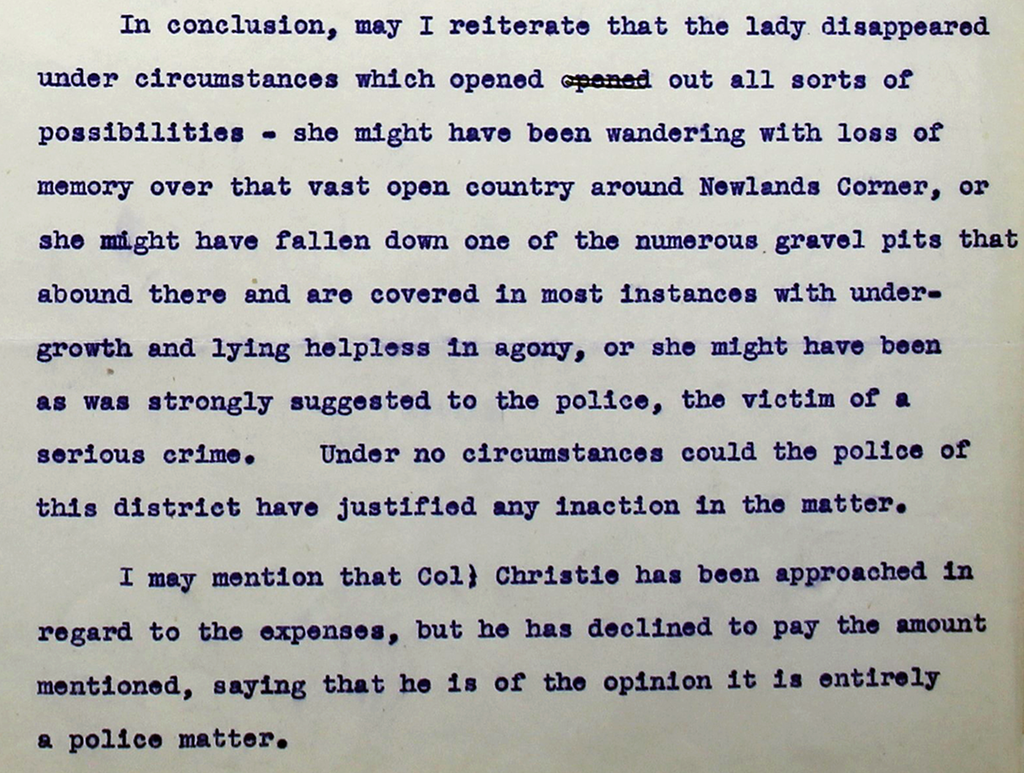
Transcript
In conclusion, may I reiterate that the lady disappeared under circumstances which opened out all sorts of possibilities - she might have been wandering with loss of memory over that vast open country around Newlands Corner, or she might have fallen down one of the numerous gravel pits that abound there and are covered in most instances with undergrowth and lying helpless in agony, or she might have been as was strongly suggested to the police, the victim of a serious crime. Under no circumstances could the police of this district have justified any inaction in the matter.
I may mention that Col) Christie has been approached in regard to the expenses, but he has declined to pay the amount mentioned, saying that he is of the opinion it is entirely a police matter.
Image 6 of 6
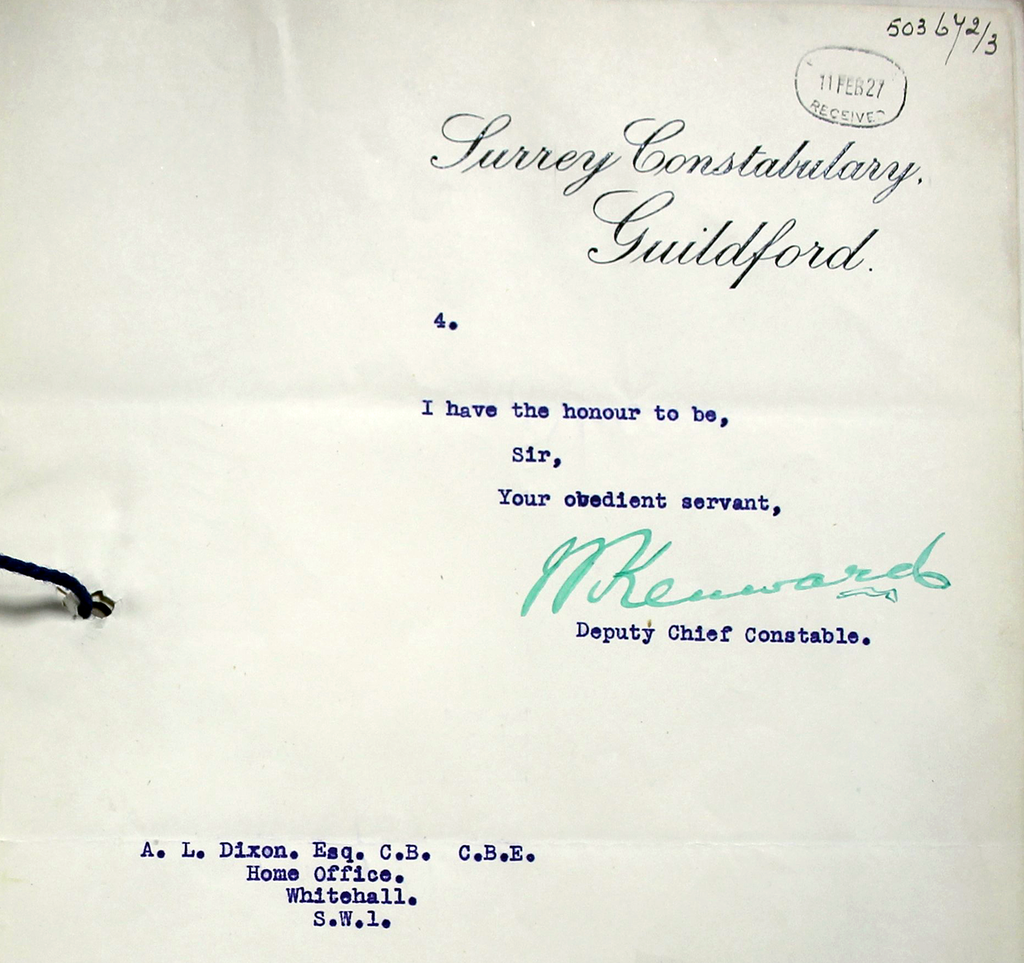
Transcript
I have the honour to be,
Sir,
Your obedient servant,
M Kennard
Deputy Chief Constable.
A. L. Dixon. Esq. C.B. C.B.E.
Home Office.
Whitehall.
S.W.1.
Why this record matters
Date: 9 February 1927
Catalogue reference: HO 45/25904
Although Agatha Christie’s literary career was reaching new heights in 1926, her personal life was less happy. Her husband Archibald Christie had been having an affair and wanted a divorce. Following an argument between husband and wife on 3 December, Archie left to spend the weekend with friends. Later that night Agatha kissed her daughter Rosalind goodnight as she slept, left the house and drove away, leaving behind a mystery.
This letter was written by Deputy Chief Constable of the Surrey Constabulary, William Kenward, to Arthur Lewis Dixon at the Home Office. It explains how, the next day, Christie’s car was discovered abandoned above a chalk quarry at Newlands Corner ‘as if it had got out of control’. The subsequent investigation included an interview with a witness who described Agatha as ‘sparsely dressed for such an inclement morning’ and appearing ‘strange in her manner’.
Many assumed the worst, and the incident generated a huge amount of press attention. Members of the public joined the police in searching for Christie and journalists put forward theories to explain her disappearance. Some suggested suicide, others that she had been murdered by her husband. And still others claimed the whole turn of events was nothing more than a publicity stunt to promote her novels.
Finally, 11 days later on 14 December, a member of the public recognised Agatha staying at the Swan Hydro hotel in Harrogate. She was suffering with memory loss and could give no account of what happened. Her biographer Andrew Norman argues that she was in a ‘fugue’ state caused by trauma or depression. However, others believed that her actions were deliberate and perhaps designed to cause distress and embarrassment to her husband.
There were concerns in some quarters that the police response had been excessive and that time and money had been wasted on the search for her. This was partly due to inaccurate press reports that aeroplanes, divers and multiple police forces had been involved.
The purpose of this particular letter was to clarify the level of police time and expenditure that the investigation involved and reassure the Home Office that the response had been proportionate. Kenward noted that there ‘is no doubt that a good deal of press matter circulated in connection with the case was without foundation. The expenses in connection with the search do not amount to more than approximately £25’.
The letter was used to inform the Home Secretary’s response to a question from Mr Neil Maclean MP asked on 25 February 1927.
Agatha’s husband, Archie Christie, responded to enquiries about his wife’s state of mind by explaining that she was suffering from a nervous disorder and memory loss. The police approached him to request a contribution towards their costs, but he refused, saying it was ‘entirely a police matter’.
The reason for Agatha's disappearance remains a mystery to this day.